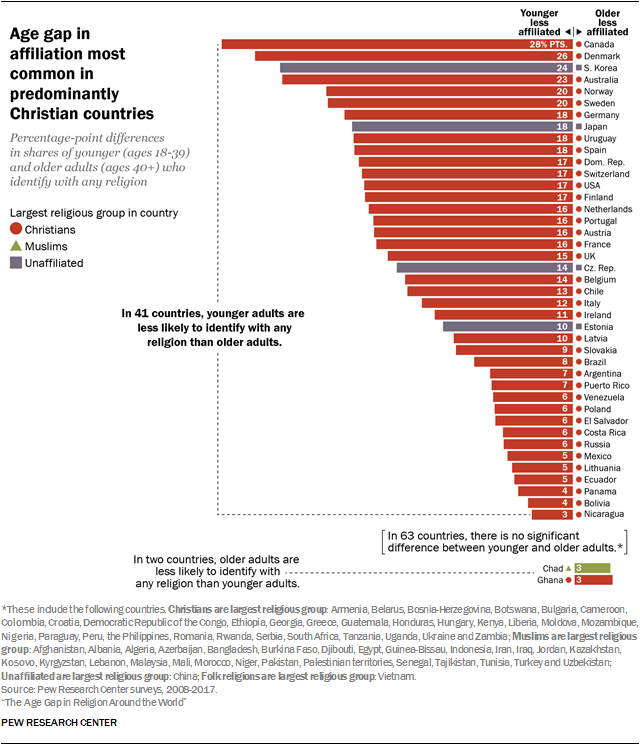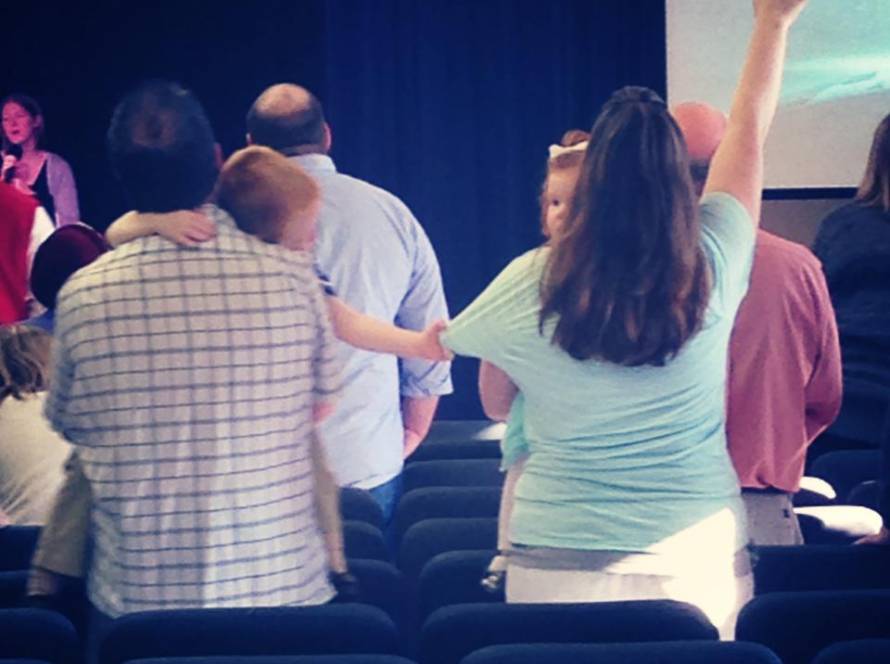Younger people are less religious than older people.
Across the board, this proves to be true. Doesn’t really matter what country one observes or what metrics one uses; statistically, research finds that younger generations tend to be less religious than those who have come before.
However, it turns out, what does matter is which religion is being studied.
According to recent Pew Research, Christianity not only has the most predominant age gap, in that it affects nearly every country that identifies as Christian, it also has the largest one by percentage meaning there is a larger gap in between the ages than other religions.
“Age gaps are also more common within some religious groups than in others. For example, religion is less important to younger Christian adults in nearly half of all the countries around the world where sample sizes are large enough to allow age comparisons among Christians (37 out of 78).
For Muslims, this is the case in about one-quarter of countries surveyed (10 out of 42). Among Buddhists, younger adults are significantly less religious in just one country (the United States) out of five countries for which data are available.
There is no age gap by this measure among Jews in the U.S. or Israel, or among Hindus in the U.S. or India.1 (Source)
The highest retention rates for religions are found in the Hindu, Muslim and Jewish communities. The lowest retention rates are found in Mainline Protestants, Buddhism, Jehovah’s Witnesses and atheism (Source).
Why?
 There are so many people asking and answering this question. There’s a lot of research being done not only on why younger generations are leaving their faith and/or their church and why some choose to stay. And there is no silver bullet or perfect answer. But here are a least a few things that we need to consider.
There are so many people asking and answering this question. There’s a lot of research being done not only on why younger generations are leaving their faith and/or their church and why some choose to stay. And there is no silver bullet or perfect answer. But here are a least a few things that we need to consider.
- Some stay away from church because they don’t feel like they belong. A study shared by Christianity Today found that about “58 percent of young adults indicated they dropped out because of their church or pastor. When probed further, they said:
-
- Church members seemed judgmental or hypocritical (26 percent).
-
- They didn’t feel connected to the people at their church (20 percent).
-
- Church members were unfriendly and unwelcoming (15 percent)
-
- Fifty-two percent indicated some sort of religious, ethical or political beliefs as the reason they dropped out.”
- Others leave because their faith or their church was never truly theirs, just something they had to do for their parents or because children’s ministry or youth group was a fun social hangout. “Consider this finding: when students involved in the College Transition Project were asked what it means to be a Christian, 35 percent “gave an answer that didn’t mention Jesus at all.” (Source)
- Still others leave because they have no relationships the church or a compelling reason to stay. According to an interview with Dr. Kara Powell of Fuller Youth Institute, “The number one reason why young people are walking away from their faith—it’s a lack of intergenerational worship and relationship” (Source).
Of course, there are more reasons, but these are some of the big ones. And the thing is, these can be easily solved!
Basically, each of these reasons boil down to this: We need faith communities that are, as Dr. Powell stated another interview, “ruthless about focusing on Jesus [and] realize that Christianity can be awkward and sometimes confusing, but Jesus is always magnetic.”
We need communities that foster a sense of belonging to something bigger, create space for intergenerational connections that are meaningful and long-lasting, and invite a willingness to engage in conversations of doubt, faith, and culture.
We can keep moving forward with age-segregated ministries, church services, and programs or we can step back, see the bigger picture, listen to what we are hearing from generations to come, and begin implementing the changes needed to address the concerns listed above.
It won’t always be comfortable for many of us to “change” and to embrace new ways of thinking and “doing” church, but it’s time to think bigger than today, bigger than “us” and consider our children, grandchildren and generations to come.
For more on these topics, check out the posts below and share your own thoughts in the comments
- Who’s staying? Those Who Stay: 3 Reasons for NOT Leaving the Church, Millenials are NOT Leaving their Faith.
- Who’s going? Unaffiliated, The Loneliest Generation and the Church’s Role
- What is Age Segregation? Age Segregation and Generational Gap: What do these mean and why does it matter to the church?
For more information about
- Kids in Worship
- Determining which Type of Family Ministry model works best for your church
- Encouraging the continued conversation through Practical Discipleship at Home
- And much more!
Check out to ReFocus Ministry or “like” our Facebook page. Join our conversation at theReFocus Family and Intergen Ministry group on Facebook.
About the author
 Christina Embree is wife to Pastor Luke, mom to three wonderful kids, and family minister at Nicholasville UMC. She is passionate about seeing churches partnering with families to encourage faith formation at home and equipping parents to disciple their kids in the faith. Currently studying Family, Youth and Children’s Ministry at Wesley Seminary, she also blogs at www.refocusministry.org and is a contributing blogger at D6 Family, Seedbed, and ChildrensMinistryBlog.com
Christina Embree is wife to Pastor Luke, mom to three wonderful kids, and family minister at Nicholasville UMC. She is passionate about seeing churches partnering with families to encourage faith formation at home and equipping parents to disciple their kids in the faith. Currently studying Family, Youth and Children’s Ministry at Wesley Seminary, she also blogs at www.refocusministry.org and is a contributing blogger at D6 Family, Seedbed, and ChildrensMinistryBlog.com



1 Comment